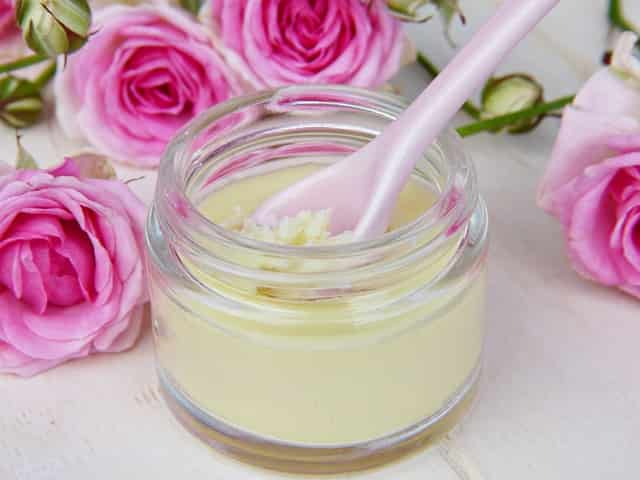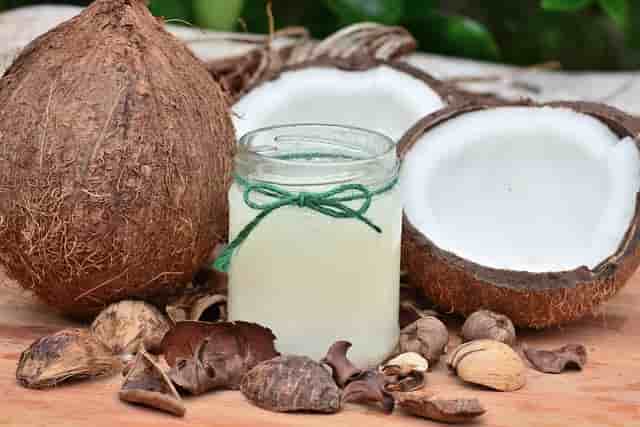When it comes to natural oils and butter, Shea butter and coconut oil are two popular choices. Both have been used for centuries for their skin and hair care benefits.
However, there is a debate on which is harder, Shea butter or coconut oil. In this article, we will explore the differences between Shea butter and coconut oil and which one is harder.
Shea Butter

Shea butter can be described as a thick, creamy substance that comes from the nut from the Shea tree. It is a light yellow or ivory-colored fat with an aroma of nutty.
Shea butter was used for many centuries in Africa to provide moisture-retaining and healing properties. It is high in Vitamins A, E, and F and also has antioxidant and anti-aging qualities. Shea butter is widely utilized for hair care, skin treatment, and cooking.
Shea Butter Uses
Shea butter was used for centuries to provide healing and moisturizing properties. It’s a versatile component that can be utilized in many techniques to nourish and protect hair and skin.
Here are a few of the most popular uses for Shea butter:
⇒ Moisturizer: Shea Butter is an ideal moisturizer for the skin. Its rich concentration of vitamins and fatty acids makes it a potent natural emollient. It helps soften and moisturize rough, dry skin. It is a great option to use throughout the body, including the hands, face lips, and feet.
⇒ The anti-aging effect: Shea butter contains antioxidants and anti-inflammatory substances that aid in reducing the appearance of wrinkles and fine lines and help promote an appearance that is more youthful. Regular usage of Shea butter can improve the firmness and elasticity of the skin and help prevent premature aging.
⇒ Soothing: Shea butter has anti-inflammatory properties that may help ease skin irritations like eczema and psoriasis as well as dermatitis. It also helps relieve itching dryness, redness, and itching caused by these conditions.
⇒ Sun Protection: Shea butter has a natural SPF of approximately 6 which makes it a great natural sunscreen that can be used for everyday use. But, it shouldn’t be used in lieu of a sunscreen that has a greater SPF, especially for prolonged periods when exposed to direct sun.
⇒ Hair Care: Shea butter is an excellent natural conditioner that can be used to treat hair. It is able to moisturize and nourish hair that is dry and brittle as well as increase hair’s quality and elasticity. It can also keep hair safe from heat and environmental damage. styling.
⇒ Stretch mark prevention: Shea butter has been shown to prevent and lessen those appearances of stretch marks. The high content of vitamins A and E helps to boost collagen production and enhance skin elasticity. This could decrease the chance of stretch marks appearing.
Shea Butter Pros and cons
Here are some of the pros and cons of using Shea butter:
| Pros | Cons |
|---|---|
| Highly moisturizing | May be too heavy for oily or acne-prone skin |
| Anti-inflammatory | May cause allergic reactions in some individuals |
| Rich in vitamins A, E, and F | May have a strong scent that some find unpleasant |
| Anti-aging properties | May be expensive compared to other moisturizers |
| Soothes skin irritations | May take longer to absorb into the skin |
| Sun protection | May not be suitable for use as a sole sunscreen |
| Hair conditioning | |
| Stretch mark prevention |
It’s worth noting that the cons listed above may not apply to everyone, and some individuals may not experience any negative effects from using Shea butter.
It’s always a good idea to patch-test any new product before using it on a larger area of the skin to avoid any potential adverse reactions.
Coconut Oil

Coconut oil can be described as a clear liquid oil taken from the meat or the kernel that matures in coconuts. It is an ingredient that is used in a variety of health and beauty products because of its moisturizing, healing, and healing qualities.
Coconut oil is high in fatty acids, Vitamins E and K. It also contains antifungal and antimicrobial properties. It is widely used for hair care, skin cooking as well as oil pulling.
Coconut Oil Uses
Coconut oil has been a well-known organic ingredient utilized for a range of uses for many centuries. It offers numerous benefits to hair, skin, and overall well-being.
Here are a few of the most popular applications of coconut oil:
⇒ Moisturizer: Coconut oil is an excellent moisturizer for the skin. It’s easy to absorb and can help soften and moisturize dry rough skin. It can be applied throughout the body, including the hands, face feet, and lips.
⇒ Anti-aging: Coconut oil contains antioxidants and fatty acids which can help to reduce the appearance of wrinkles and fine lines and help improve the appearance of your complexion. Regular consumption of coconut oil can increase the elasticity of skin and firmness and help stop premature aging.
⇒ Hair treatment: Coconut oil is an excellent natural conditioner for hair. It is a great way to nourish and soften fragile, dry hair as well as increase the elasticity of hair and shine. It can also keep hair safe from heat and environmental damage. styling.
⇒ Oral health: Coconut oil has antimicrobial properties that help to kill harmful bacteria that can cause mouth infections and help keep bad breath from developing and causing tooth decay. It also helps whiten teeth and improve the overall health of your mouth.
⇒ Weight loss: Coconut oil has medium-chain triglycerides (MCTs) which help increase metabolism and aid in weight loss. Research has proven that adding coconut oil to your diet may help to decrease body fat as well as enhance overall health.
⇒ Cooking: Coconut oil is a well-known cooking oil that is utilized for baking, frying sauteing, and baking. It has an extremely high smoke point making it an excellent option for cooking at high temperatures.
Coconut oil Pros and cons
| Pros | Cons |
|---|---|
| Highly moisturizing | May clog pores and cause acne in some individuals |
| Anti-aging properties | May not be suitable for those with oily skin |
| Hair conditioning | May not be suitable for those with protein-sensitive hair |
| Oral health benefits | May not be suitable for those with nut allergies |
| May promote weight loss | May be high in calories and fat |
| Versatile cooking oil | May have a strong scent and flavor that may not be desirable in all dishes |
| Contains healthy fats | May be more expensive compared to other cooking oils |
It’s important to note that the negatives mentioned above might not be applicable to all however, some people may not experience negative side consequences of the use of coconut oil.
Like any other new product, it’s recommended to do a patch test prior to using it over a large area of your skin or adding it to your diet.
Hardness Comparison
Shea butter comes in the form of a firm butter with an extremely firm texture. It has a similar consistency to cocoa butter or mango butter. Coconut oil however is a liquid oil that becomes solid when temperatures fall below the 76degF mark (24degC). At the temperature of room temperature coconut oil is typically in a semi-solid form, but it could become liquid when heated.
In terms of its hardness, Shea butter is generally thought to be harder than coconut oil. This is due to the fact that Shea butter has an increased melting point than coconut oil which implies that it remains solid at the temperature of the room. Coconut oil is, however, more liquid and viscous at temperatures of room temperature. But Shea butter and coconut oils are both soft and simple to work with and can be solidified and melted whenever required.
Coconut Oil Vs Shea Butter: Which is the Best?
The decision between coconut oil and Shea butter will ultimately depend on the individual’s preference, type of skin, and specific requirements. Both ingredients offer distinct advantages and applications.
Coconut oil is an incredibly versatile product that could be utilized to serve a range of needs such as moisturizing, anti-aging, and hair treatment. Additionally, it has oral health benefits and weight loss advantages and is used in cooking oils. But, it may not be appropriate for people who have oily skin. It could clog pores, causing acne in some people. It might also cause problems for people who have allergies to nuts.
However, Shea butter is a very moisturizing and nourishing ingredient that is high in vitamins and also has anti-inflammatory properties. It is especially effective for sensitive or dry skin and is also utilized for hair care. But, Shea butter may be too heavy for acne-prone or oily skin and could cause allergic reactions in certain people. It also has an unpleasant scent that some may find unpleasant and can be expensive in comparison to other moisturizers.
Conclusion
In the end, I would say that the two Shea butter, as well as coconut oil, make excellent natural ingredients that offer many benefits to hair and skin.
Although Shea butter is typically thought to be harder than coconut oil however both oils are simple to use and can be solidified and melted as necessary.
The decision of Shea butter or coconut oil is based on personal preference and the needs specific to your hair and skin. It is recommended to test both to see which will work best for you.
Other Links:-









